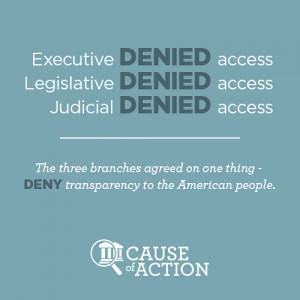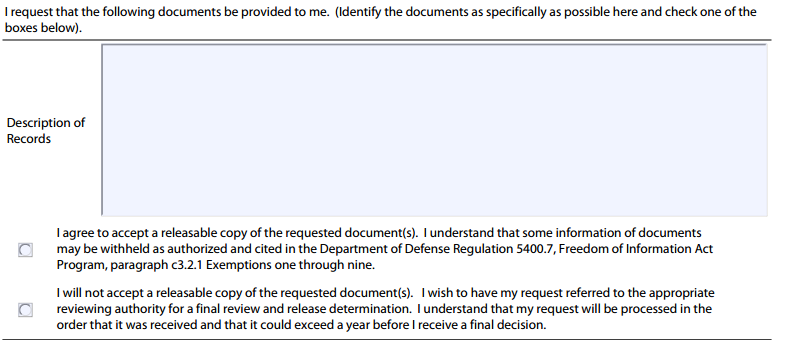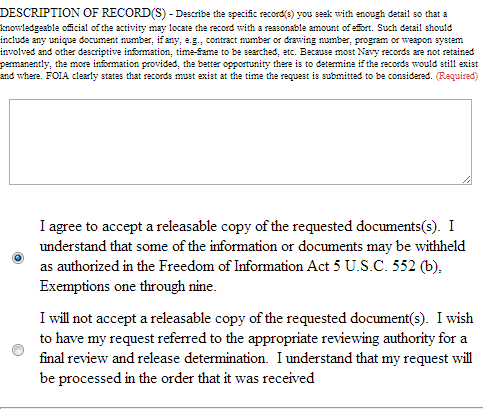For more than two years, Cause of Action has been fighting to gain public access to the Financial Crisis Inquiry Commission (FCIC) documents transferred without restriction in March 2011 by the National Archives and Records Administration (NARA) to the House Committee on Oversight and Government Reform (OGR). The FCIC was a temporary commission created in the legislative branch to investigate the causes of the financial crisis. Today, Cause of Action advanced oral arguments in the United States Court of Appeals for the District of Columbia Circuit explaining NARA’s wrongful withholding of FCIC records. NARA’s unsupported position is that these records are not subject to the Freedom of Information Act (FOIA), a position belied by both the facts and law of the case.
We submitted a FOIA to NARA in October 2011 for “all documents, including email communications, memoranda, draft reports and other relevant information and/or data contained in the records transfer of Financial Crisis Inquiry Commission documents stored at NARA to the Committee on Oversight and Government Reform at the U.S. House of Representatives.” A month later, NARA denied our request claiming that the records are not “agency records” and that the FCIC established a five-year restriction on public access to the records.
After our appeal of the FOIA response was denied, Cause of Action filed a lawsuit in August 2012 against NARA for wrongfully withholding records pertaining to the FCIC and claiming these records are not subject to FOIA. NARA filed a request for a dismissal of the case in the District Court for the District of Columbia, which was granted in March 2013. CoA filed a timely appeal In the United States Court of Appeals for the District of Columbia Circuit.
Congress did not address what would happen to FCIC records
We argue that because NARA has possession and complete control of the documents that contributed to the FCIC’s report on the 2008 financial crisis, those documents are subject to FOIA. NARA’s claim is that since the FCIC was a commission created by Congress, FCIC records are per se legislative branch records, which are not subject to FOIA. However, Section 5 of the 2009 Fraud Enforcement Recovery Act (FERA), which established the FCIC, did not address records preservation or dissemination at termination of the commission. Further, no other federal statute suggests that Congress intended to restrict access to these records under FOIA. And the presumptive disclosure of documents and broad public access under FOIA is further support for the release to the American people of the FCIC records.
Executive branch agency records are contained within the FCIC records
Cause of Action submitted a March 2, 2011 letter from NARA to OGR to further explain our arguments in an opposition we filed January 24, 2014 in the United States Court of Appeals for the D.C. Circuit. NARA’s letter to OGR is a response to a February 18, 2011 letter from Chairman Darrell Issa requesting records from the Financial Crisis Inquiry Commission (FCIC).
- The letter reveals that:
- NARA knowingly possessed executive agency records as a releasable subset of the FCIC records, and these records were disclosed to OGR by NARA without restrictions of any kind.
- NARA specifically contemplated that the records were subject to FOIA.
An FCIC staffer crossed out FOIA language in a transfer form given to NARA
The transfer of the FCIC records to NARA included a transfer letter and Standard Form 258 (SF-258), where the FOIA language was crossed out by hand by a staffer for FCIC Chairman Phil Angelides. From our opening brief:
“Rather than enumerate a specific FOIA exemption or other legal basis for his desire to restrict public access to the FCIC records, Mr. Angelides, by proxy, crossed out by hand the mandatory FOIA language from the Standard Agreement, and authored an aspirational letter that carries no legal effect. Specifically, his letter “recommended” that NARA restrict access to the records, and “encouraged” the Archivist to carry out these recommendations. Despite Mr. Angelides’s best laid hopes, he cited no legal authority for restricting access.”
Normal NARA transfer letter
Normal transfer letter which states in first paragraph: “The transferring agency certifies that any restrictions on the use of these records are in conformance with the requirements of 5 U.S.C. 552 [FOIA].”
NARA Transfer letter with FOIA crossed out by FCIC staffer
The transfer letter from FCIC to NARA with the section related to FOIA crossed out by a proxy for FCIC Chairman Phil Angelides (highlight added by author).
Legislative Branch files amicus brief against transparency
The Executive and Judicial branches have made it clear that they want to keep the public in the dark on the financial crisis, but in November the legislative branch joined them in opposing transparency. The Bipartisan Legal Advisory Group (BLAG) made a highly unusual move by filing an amicus brief in support of NARA’s effort to shield the American public from knowing the truth about the financial crisis. BLAG consists of the five members of House leadership, and was last deployed to defend the Defense of Marriage Act (DOMA) by a 3-2 vote in March 2011.
It is our firm belief that American taxpayers deserve to know what information contributed to the FCIC’s findings on the financial crisis. The “most transparent administration in history” should live up to its promise and release the FCIC records. After all, the American people paid for the FCIC documents and should be granted full access.
Find all of the court filings for this case here.




